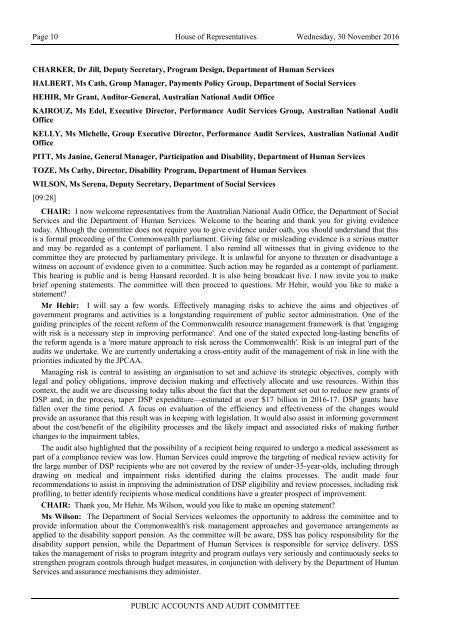Proof Committee Hansard
2hbqb7M
2hbqb7M
Create successful ePaper yourself
Turn your PDF publications into a flip-book with our unique Google optimized e-Paper software.
Page 10 House of Representatives Wednesday, 30 November 2016<br />
CHARKER, Dr Jill, Deputy Secretary, Program Design, Department of Human Services<br />
HALBERT, Ms Cath, Group Manager, Payments Policy Group, Department of Social Services<br />
HEHIR, Mr Grant, Auditor-General, Australian National Audit Office<br />
KAIROUZ, Ms Edel, Executive Director, Performance Audit Services Group, Australian National Audit<br />
Office<br />
KELLY, Ms Michelle, Group Executive Director, Performance Audit Services, Australian National Audit<br />
Office<br />
PITT, Ms Janine, General Manager, Participation and Disability, Department of Human Services<br />
TOZE, Ms Cathy, Director, Disability Program, Department of Human Services<br />
WILSON, Ms Serena, Deputy Secretary, Department of Social Services<br />
[09:28]<br />
CHAIR: I now welcome representatives from the Australian National Audit Office, the Department of Social<br />
Services and the Department of Human Services. Welcome to the hearing and thank you for giving evidence<br />
today. Although the committee does not require you to give evidence under oath, you should understand that this<br />
is a formal proceeding of the Commonwealth parliament. Giving false or misleading evidence is a serious matter<br />
and may be regarded as a contempt of parliament. I also remind all witnesses that in giving evidence to the<br />
committee they are protected by parliamentary privilege. It is unlawful for anyone to threaten or disadvantage a<br />
witness on account of evidence given to a committee. Such action may be regarded as a contempt of parliament.<br />
This hearing is public and is being <strong>Hansard</strong> recorded. It is also being broadcast live. I now invite you to make<br />
brief opening statements. The committee will then proceed to questions. Mr Hehir, would you like to make a<br />
statement?<br />
Mr Hehir: I will say a few words. Effectively managing risks to achieve the aims and objectives of<br />
government programs and activities is a longstanding requirement of public sector administration. One of the<br />
guiding principles of the recent reform of the Commonwealth resource management framework is that 'engaging<br />
with risk is a necessary step in improving performance'. And one of the stated expected long-lasting benefits of<br />
the reform agenda is a 'more mature approach to risk across the Commonwealth'. Risk is an integral part of the<br />
audits we undertake. We are currently undertaking a cross-entity audit of the management of risk in line with the<br />
priorities indicated by the JPCAA.<br />
Managing risk is central to assisting an organisation to set and achieve its strategic objectives, comply with<br />
legal and policy obligations, improve decision making and effectively allocate and use resources. Within this<br />
context, the audit we are discussing today talks about the fact that the department set out to reduce new grants of<br />
DSP and, in the process, taper DSP expenditure—estimated at over $17 billion in 2016-17. DSP grants have<br />
fallen over the time period. A focus on evaluation of the efficiency and effectiveness of the changes would<br />
provide an assurance that this result was in keeping with legislation. It would also assist in informing government<br />
about the cost/benefit of the eligibility processes and the likely impact and associated risks of making further<br />
changes to the impairment tables.<br />
The audit also highlighted that the possibility of a recipient being required to undergo a medical assessment as<br />
part of a compliance review was low. Human Services could improve the targeting of medical review activity for<br />
the large number of DSP recipients who are not covered by the review of under-35-year-olds, including through<br />
drawing on medical and impairment risks identified during the claims processes. The audit made four<br />
recommendations to assist in improving the administration of DSP eligibility and review processes, including risk<br />
profiling, to better identify recipients whose medical conditions have a greater prospect of improvement.<br />
CHAIR: Thank you, Mr Hehir. Ms Wilson, would you like to make an opening statement?<br />
Ms Wilson: The Department of Social Services welcomes the opportunity to address the committee and to<br />
provide information about the Commonwealth's risk management approaches and governance arrangements as<br />
applied to the disability support pension. As the committee will be aware, DSS has policy responsibility for the<br />
disability support pension, while the Department of Human Services is responsible for service delivery. DSS<br />
takes the management of risks to program integrity and program outlays very seriously and continuously seeks to<br />
strengthen program controls through budget measures, in conjunction with delivery by the Department of Human<br />
Services and assurance mechanisms they administer.<br />
PUBLIC ACCOUNTS AND AUDIT COMMITTEE















